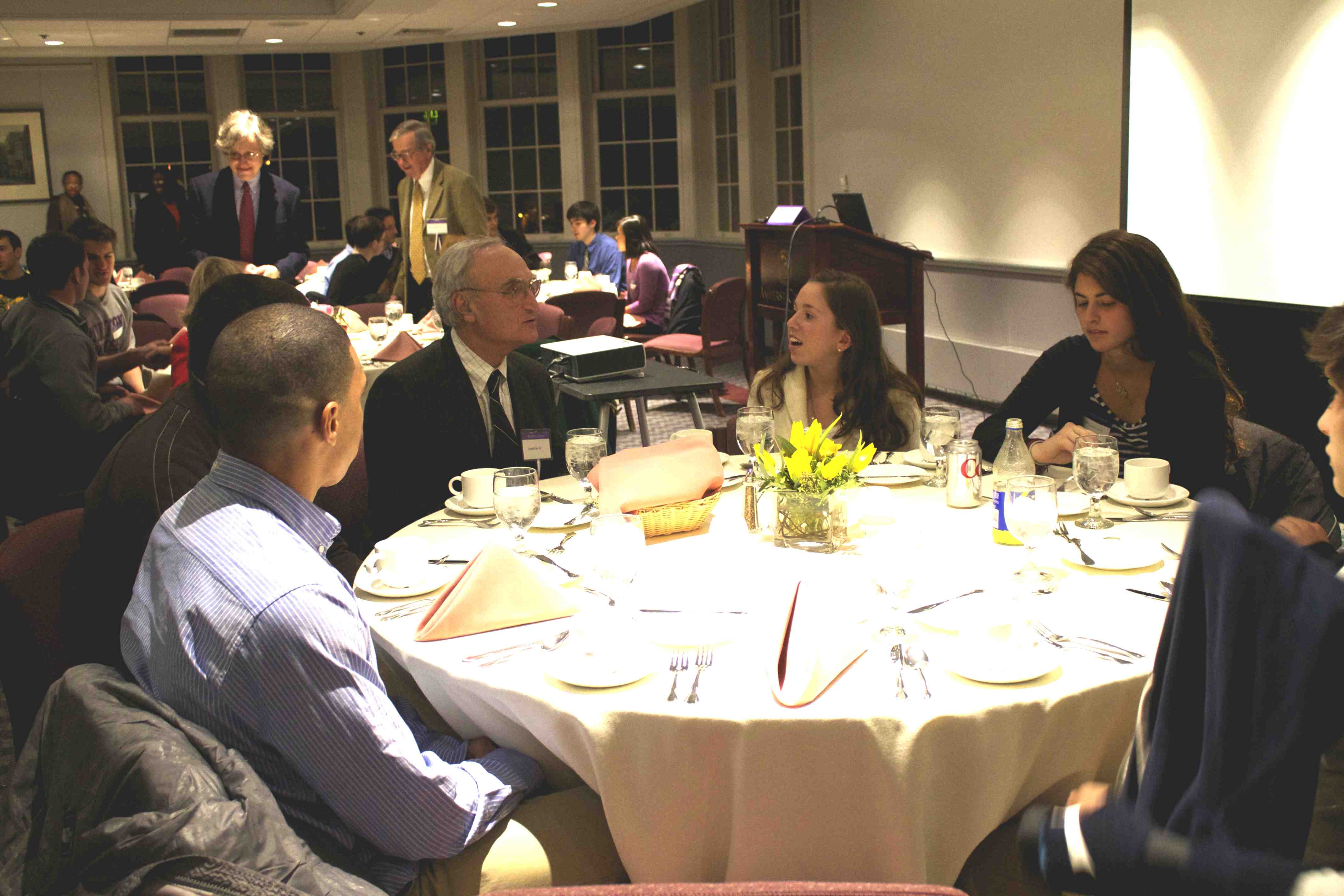

The College recently held the fourth annual Gerald R. Fink ’62 Bioscience Symposium. Over 150 students registered for the event, which is the largest registration the symposium has received thus far. The subject of the symposium, proposed by Dr. Fink himself was “The Value of Taking Risks Early in a Career.” The Class of ‘62 sponsored the event.
“It is extremely gratifying since this symposium lands on our 50th reunion year,” said George Carmany ’62. Carmany is one of the founders and organizers of the symposium.
The event opened with remarks from Carmany, a senior advisor for Brown Brothers Harriman and Essex Woodlands Health Ventures, and Fink, an MIT professor, nationally known scientist and former director of The Whitehead Institute. Carmany emphasized that all of the speakers had taken a significant risk at the outset of their careers and had not followed conventional pathways on their way to significant achievement.
Fink elaborated on the theme of the night, stating when describing how he chose to go to graduate school instead of medical school after graduation.
“I turned my back on a career in medicine and went to graduate school at Yale. It didn’t seem risky at the time. I was just putting one foot in front of the other and doing what I like,” Fink said. “No one can see the future.”
Fink also emphasizing the importance of collaboration in science.
“There is a culture in the scientific field that is amazing. It has a great collaborative nature, from the mentoring of students by teachers and colleagues, colleagues mentoring colleagues. We want younger students to do well,” Fink said. “No one can easily succeed in science without good collaborations.”
The first official speaker was Peter Reddien, a member of the Whitehead Institute and an associate biology professor at MIT who, early in his career, chose to pursue the field of organ regeneration, which was not a mainstream scientific topic, becoming a nationally recognized authority. He was followed by Fred Sadler ’62, who was trained as a surgeon before founding the Physician Assistant program that has produced 85,000 “PAs” who are currently practicing, which is of particular social value in today’s environment, in which the front-line primary care system is badly strained and access to quality affordable care has become more difficult.
“I am thrilled to come back [to the College], and I feel it is a great honor to be a part of this symposium. Gerry Fink is a classmate, George Carmany is a classmate, Jim Guest is a classmate and, not only that, most of us grow up as freshmen on fourth floor Morrow, which is rather remarkable,” Sadler said.
The third speaker was Jim Guest ’62, who worked in public service in Vermont and ran as a Democratic candidate for the U.S. Senate before becoming President of the Consumer’s Union. He has also undertaken a major program addressing the current shortcomings of consumer access to the health care system. The final speaker before dinner was Tenley Albright, the 1956 figure skating Olympic Gold medalist who graduated as a surgeon from Harvard Medical School and is currently Director of the MIT Collaborative Initiatives program.
The event then moved to Lewis Sebring, where students ate with the speakers, enjoying the opportunity to ask questions, listen to anecdotes and connect with the speakers.
“I think the interactions we had between students and speakers was better than it’s ever been,” Carmany said.
After dinner, John Abele ’59 addressed the crowd. Abele co-founded Boston Scientific at the age of 28 and is a former trustee of the college. He spoke of his experiences in collaborative problem solving.
“I think perhaps a lot of liberal arts schools have the same philosophy, which is to educate broadly, learn how to understand from different perspectives, understand the power of words, understand music, numbers, science, art and be able to integrate them and that will be helpful for you for the rest of your life, and it may in fact make you very unique,” Abele said. “So at the end of the day, an Amherst education is going to lead to a collaborative leader.”
Carmany noted that he hoped students who went to the event would take away some scientific knowledge and some knowledge of public policy as it relates to health care.
“We especially hope that they will take away an impression that a bunch of people who are now pushing 72, and one a few years ahead of that, have taken the time to come back,” Carmany said. “There were 50 members of my little class of 240 who went into medicine or science, and I could get half of them to come back and do this. That is something really special.”